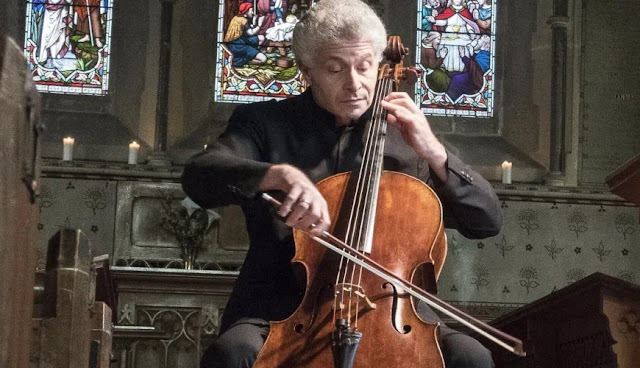 |
| Robert Max (Photo Claude Darmon) |
Bach Six Cello Suites; Robert Max; Conway Hall
Reviewed by Robert Hugill on 30 January 2022 Star rating: (★★★★★)
A marvellous opportunity to hear all six cello suites in performances at once very personal and very communicative
In 1728, some eight to ten years after their composition, Bach wife Anna Magdalena took the trouble to make a fine copy of her husband's six Suites à Violoncello solo senza basso (now commonly known as the unaccompanied cello suites). We don't know much about the background to this wonderful music, for whom and for what occasion it was written. The consistency of the works' structures suggests they were conceived as a group. And whilst Bach might have been surprised at the idea of performing all six suites at one sitting (and there again, maybe he wouldn't be) they make a highly satisfying whole.
Cellist Robert Max planned to perform Bach's six Cello Suites in 2020, touring the programme with a performance at Conway Hall. This was fated not to happen. Luckily for us the performances were re-scheduled, so, on Sunday 30 January 2022, Robert Max performed Bach's Cello Suites at Conway Hall's Sunday Concert Series. And before hand, I gave the pre-concert talk.
To play the six suites in one sitting (and from memory) is already an impressive feat of musicianship but Max did not give the impression of virtuoso bravura, more he gave us the sense of creating the music on the spot, a sense of constant improvisation.
The first three suites were fleet and fluid, with a strong sense of rhythm and a lovely improvisatory feel to the detail, a sense of being always in the moment. As the movements moved from the perky to the resonant to the mellow and the melancholy we were constantly drawn along. And what I particularly enjoyed was the way Max was thinking in whole paragraphs, pacing each movement as part of a 36 movement whole!The first three suites (the shortest) each have a tonality based on one of the cello's open strings, quite a sensible manoeuvre when you are writing for a solo instrument. But for the second three suites, Bach starts to play tricks on us. For a start, the music here is more verdant, he seems to have more ideas to fit in and Max's approach was far more expansive. But there are the keys and their relationship to the cello's tuning. The fourth suite is in E flat, not one of the instrument's open strings and that immediately brings a darker tone tone to the performance. Then for the fifth suite, whilst this is in C minor the top string is tuned down to G (from A), thus giving the instrument an entirely different set of resonances. And finally, the sixth suite (in D) is written for a five-string cello with the top string tuned to E.
Hearing the music live, in such a finely intimate situation brought home this sense of playing with tuning and resonance. Added to which it was clearly demonstrated to us; for the fifth suite we watched Max re-tune his Stradivarius cello, and then for the sixth suite he played on an entirely different instrument.
Max's main cello is the 'Comte de Saveuse' Stradivarius cello which dates from 1726, a quite compact instrument with a richness of tone and lovely dark varnish. Whilst the cello itself dates from close to the time of Bach's writing the suites, it was modernised in the early 20th century so that Max played with a modern set-up. This hardly mattered, what was important was the very personal and very communicative nature of his performance. And hearing it in such a finely intimate space as Conway Hall was the most perfect experience.
Never miss out on future posts by following us
The blog is free, but I'd be delighted if you were to show your appreciation by buying me a coffee.
Elsewhere on this blog
- Love & dissimulation: Alessandro Stradella's opera Amare e fingere explores the 17th centuries fascination with Arcadia - record review
- Expanding her horizons: Lada Valesova on conducting Tchaikovsky's Eugene Onegin at Opera Holland Park this Summer - interview
- 1772: A Retrospective - The Mozartists in Mozart, Haydn and more exploring the musical world of the 16-year-old composer - concert review
- Inspired by the Sistine Chapel: Peter Phillips & The Tallis Scholars explore some of the riches written for the Papal choir - concert review
- The Irish Double Bass: Malachy Robinson goes on a personal odyssey - record review
- Love, jealousy, death and a wedding: Handel's Aci, Galatea e Polifemo from Orchestra of the Age of Enlightenment - concert review
- You have two ears and an opinion: artistic director Fiachra Garvey introduces this year's Classical Vauxhall festival - interview
- Decadence and refinement: Karina Canellakis conducts Scriabin's Poem of Ecstasy with the London Philharmonic Orchestra - concert review
- Winter Opera St Louis educates as it entertains - guest posting
- Pure joy: ECHO Rising Star recorder player Lucie Horsch & lutenist Thomas Dunford in music old & new - concert review
- Beyond Miss Julie: Joseph Phibbs on his opera Juliana setting Laurie Slade's updating of Strindberg - interview
- Opera scenes from the Young Artists of the National Opera Studio with the orchestra of English National Opera at Cadogan Hall - concert review
- Home











No comments:
Post a Comment